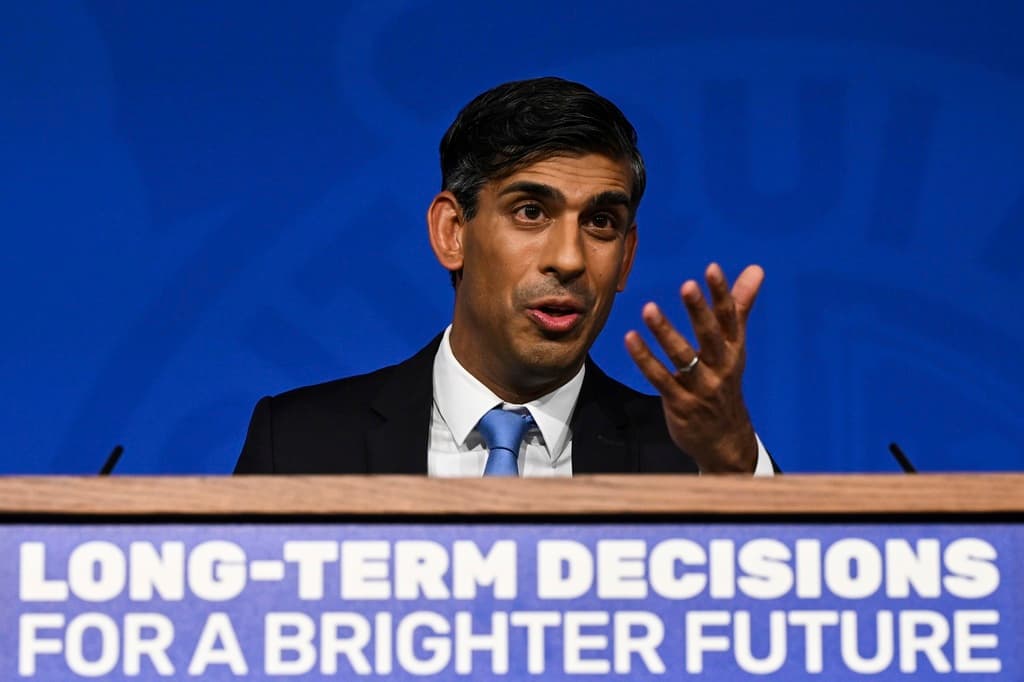Conservatives Deny Sunak Will Resign Over D-Day Flap as Farage Factor Surges Forward
With the results of the general election are more or less a foregone conclusion, the real drama centers around the fortunes of the right.

From rumors that Premier Sunak will resign to startling seat projections for the three key parties campaigning for votes, what a difference a week makes in UK politics.
The election news cycle seems only to have “hotted up,” since Nigel Farage announced a week ago that he would be representing Reform UK in the contest at Clacton.
Latest polling doubles down on the volatile nature of the electorate. The opposition Labour party is set to win 416 seats, according to a Daily Mail poll, with 46 percent of the vote.
The governing Tories, meanwhile, 25 points behind Labour at 21 percent, will be left with a rump in Parliament of 37 seats. The Deltapoll survey places Reform UK support at 12 percent.
The poll was taken mid-way through Mr. Sunak’s disastrous decision to leave half-way through the 80-anniversary D-Day celebrations at Normandy. Initially reported he returned to London to conduct an interview, later reports confirmed it was to sign off on the Conservative campaign manifesto.
Though Mr. Sunak later made amends — “It was a mistake not to stay in France longer and I apologize” — the damage was done.
The Prime Minister gave no interviews at the weekend, with Conservative Campaign Headquarters at one point curtailing all media outreach during the fallout.
British punters were taking odds that Mr. Sunak would resign even before polling day. Ministers met the Sunday sit-downs to dispel the rumors, with the London Sun running the headline: “Rishi Sunak will ‘absolutely’ lead Tories into general election.”
Nevertheless, speculation mounts over who could lead the Tories were the Prime Minister to fall on his sword.
As for who may lead the Conservatives if they fall on election night, one surprising name comes forward: Nigel Farage.
A Redfield and Wilton poll conducted after his return to front-line politics favored the Reform leader to helm the Tories over a list of current Conservative MPs, if the party is booted from office.
On his part, Mr. Farage is not averse to the idea. Only in his scenario, what remains of the Tories are folded into his rising party on the right.
For there are two other polls of last week to consider. A YouGov poll conducted on modified methods for greater consistency, showed the Conservatives leading Reform, 19 percent to 17 percent, with Labour leading at 40 percent.
Yet if that same poll had been conducted along its former methodology — that remains a credible alternative — both the Tories and Reform would be tied at 18 percent.
Furthermore, a Survation survey gives Reform favorable odds to winning 3-4 seats at the election. What is more, Survation shows that in at least one constituency, Reform beats out the Conservatives for second place after Labour.
What this means in theory is that the Tories become the spoiler party, splitting the right-wing vote and taking the seat from Reform and giving it to Labour. This phenomenon looks likely to increase.
From little acorns great oaks take root.
The results of the general election are more or less a foregone conclusion. The real drama centers around the fortunes of the right, as the Conservatives limp from crisis to crisis, hemorrhaging support to Reform.
Nor can it be overlooked that, by the account of some polls, Labour support is dropping slightly. Some of this newfound Reform momentum must come from Labour, too.
For while Mr. Farage is the beneficiary of traditional conservatives who would otherwise sit out this election, he is also winning over a contingent from the traditional working-class left.
Reform’s membership is on the march, having grown by 10,000 paid supporters this week — 40,000 from 30,000 — and one new supporter every 36 seconds on Sunday.
Everything is in flux, Heraclitus would say. Or, to be even more dramatic, we can reflect on the Austrian economist Ludwig von Mises.
He described the climax of hyperinflation as “the flight into real goods” — when fiat paper money became worthless and barter becomes the preferred method of exchange.
“Katastrophenhausse,” or “crack-up boom,” as Herr Mises termed it. As UK voters flee the Conservative party and the Tories experience their own crack-up, will Reform UK become the new “gold standard” on the right, as Brexiteers flee to Nigel Farage?

